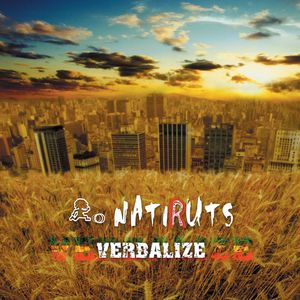On the following albums (Verbalize - 2001 and Quatro - 2002) Tonho Gebara participated (solo electric guitar). Nowadays, Alexandre finds himself as lead vocalist and guitar player accompanied by Luis, Bruno, Isabella and drummer Juninho. Natiruts aim to represent brazilian roots reggae.
Discípulo de Mestre Bimba
Natiruts Lyrics
Jump to: Overall Meaning ↴ Line by Line Meaning ↴
Agradece ao pй da cruz a roda de todo dia
Hб muito tempo na praia de Amaralina
Um negro mandingueiro cujo nome era Bimba
Inventou a capoeira
Iф, Iф, Iф, Iф, vou ver seu Bimba lб no mar
Iф, Iф, Iф, Iф, quando o berimbau chamar
Iф, Iф, Iф, Iф, no toque da regional
E a capoeira foi crescendo e se expandiu
Hoje й filosofia de vida em todo o Brasil
E o mais forte de tudo й a perseveranзa
A esperteza e a malandragem
Que sу tem quem tem coragem
E й discнpulo de Bimba
Iф, Iф, Iф, Iф, vou ver seu Bimba lб no mar
Iф, Iф, Iф, Iф, quando o berimbau chamar
Iф, Iф, Iф, Iф, olha a mandinga e o mortal
Iф, Iф, Iф, Iф, chora Angola e Iuna
Iф, Iф, Iф, Iф, o capoeira sempre estб
The song "Discipulo De Mestre Bimba" by Natiruts pays homage to the development and the expansion of the Brazilian martial art form Capoeira. The lyrics trace the roots of Capoeira to Bahia, where it originated, and expresses gratitude to the African Mandingueiro named Bimba, who invented Capoeira. The opening lines of the song state that Capoeira owes its existence to the daily circle played at the foot of the Cross. The chorus of the song ("Iф, Iф, Iф") calls out Bimba's name and praises the specific style of Capoeira known as "Regional," which was developed by him.
The second verse delves deeper into the development of Capoeira, emphasizing its growth as a philosophy of life that has spread throughout Brazil. It talks of the qualities that are essential for Capoeira practitioners to possess, such as perseverance, quick thinking, and the "malandragem," which means "street smarts." The phrase "Quem tem coragem," which means "whoever has courage," underlines the importance of bravery for someone who wants to practice Capoeira, especially in the style developed by Bimba.
Overall, the song celebrates the history and philosophy of Capoeira and pays tribute to its founder, Bimba, who played a crucial role in bringing this art form to the world.
Line by Line Meaning
A capoeira que nasceu lá na Bahia
The art form of capoeira originated in Bahia.
Agradece ao pé da cruz a roda de todo dia
Everyday capoeiristas give thanks for the roda at the foot of the cross.
Há muito tempo na praia de Amaralina
Long ago on the beach of Amaralina.
Um negro mandingueiro cujo nome era Bimba
A black mandingueiro whose name was Bimba.
Inventou a capoeira
Invented capoeira.
Iê, Iê, Iê, Iê, vou ver seu Bimba lá no mar
Iê, Iê, Iê, Iê, I'll see Bimba by the sea.
Iê, Iê, Iê, Iê, quando o berimbau chamar
Iê, Iê, Iê, Iê, when the berimbau calls.
Iê, Iê, Iê, Iê, vamos todos se embalar
Iê, Iê, Iê, Iê, let's all get swayed.
Iê, Iê, Iê, Iê, no toque da regional
Iê, Iê, Iê, Iê, to the sound of the regional.
E a capoeira foi crescendo e se expandiu
And capoeira grew and expanded.
Hoje é filosofia de vida em todo o Brasil
Today it is a philosophy of life throughout Brazil.
E o mais forte de tudo é a perseverança
And the strongest of all is perseverance.
A esperteza e a malandragem
Cunning and the art of being street smart.
Que só tem quem tem coragem
That only exists in those who have courage.
E é discípulo de Bimba
And are disciples of Bimba.
Iê, Iê, Iê, Iê, olha a mandinga e o mortal
Iê, Iê, Iê, Iê, look at the mandinga and the mortal.
Iê, Iê, Iê, Iê, chora Angola e Iuna
Iê, Iê, Iê, Iê, Angola and Iuna cry.
Iê, Iê, Iê, Iê, o capoeira sempre está
Iê, Iê, Iê, Iê, the capoeira is always there.
Contributed by Aiden Y. Suggest a correction in the comments below.
